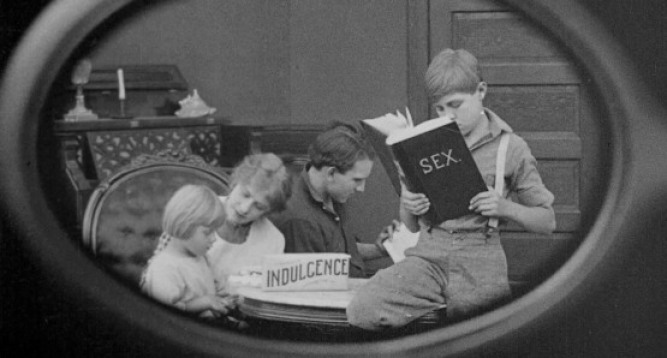In 1916, Universal’s most successful film was Where Are My Children?, a film about birth control and abortion made by Lois Weber, a female director who just happened be the first woman elected to the Motion Picture Directors Association, whose name was routinely mentioned alongside D.W. Griffith and Cecil B. DeMille. But where Griffith and DeMille retain their grasps on the history of cinema, Weber and so many pioneering female directors like her have been treated as footnotes, if they’re treated at all. These are women like Alice Guy-Blaché, who founded the largest pre-Hollywood studio in America; Mabel Normand, who directed Charlie Chaplin and Fatty Arbuckle; Zora Neale Hurston, who made documentaries focusing on the African-American experience in the Deep South; and Marion A. Wong, who produced and directed the first American film with an all-Chinese cast. These women and many others are finally getting their due with the release of Kino Lorber’s collection Pioneers: First Women Filmmakers, now on Blu-ray and DVD.

Kino has collected an embarrassment of riches here, featuring shorts, fragments, and full-length features from female directors across a multitude of genres and subjects, all of them from the early period of cinema and many from pre-Hollywood years. All have been restored to their best possible conditions. Many of the issues presented are still topical, something which we’ve forgotten to expect from older films. This is cinema before the Production Code dictated what could and could not be shown, and so many of these films deal with gender, sexuality, abortion, prostitution, racism, marriage, poverty, and sexual assault. There are movies like a fragment of Ida May Park’s Bread, which centralizes a young woman’s experience when a theatrical agent attempts to assault her, and Lois Weber’s Where Are My Children?. Weber’s film in particular is both fascinating and disturbing, very much a product of its time in representing arguments about eugenics, class, and right-to-life, but it is unique in presenting a multi-faceted view of abortion at a time when it was both illegal and extremely dangerous.
The multiplicity of viewpoints in this collection means that it does not look at female directors as a monolith. These are women as different, as diverse, and as varied in their approach to filmmaking as any group of male directors, and what they accomplished during a fairly short period is remarkable. The female gaze is all important, refracting the subjects through a female perspective. These women saw film as an opportunity for women to express themselves, producing works of art and of entertainment that represented their ethical, political, and social positions without interference from male-dominated studios or producers.
But Pioneers isn’t just about the prestige drama or the social problem film, and many of the same filmmakers chose to deal with genre entertainments as well. In the genre section of the collection are comedy shorts, Westerns, chase movies, and crime films, many of them focusing on female heroines and often starring the directors themselves. Mabel Normand, famous for her association with Mack Sennett and her long-term partnerships with Chaplin and Fatty Arbuckle, appears in several shorts that she either directed or co-directed, showcasing her formidable talents as a comedienne in her own right. There are Westerns like The Little Rangers, an episodic series that features women as horse-riding heroines, and Algie the Miner, a Western comedy about a “dandy” who makes good in the Old West (both directed by Alice Guy-Blaché). Serial features include The Hazards of Helen, directed by its star Helen Holmes, and detective and crime stories directed by Grace Cunard. Many of these films exist only in fragments or as single episodes that were originally part of a longer series, but they are entertaining for all that, and the skill and influence of their directors and stars is still in evidence.
The curators of this collection have avoided the pitfalls of depicting early filmmaking as a white woman’s medium, collecting and restoring films from filmmakers of color, many of whom worked outside the contemporary Hollywood mainstream. This includes the newly restored The Curse of Quon Gwon from 1916, a full-length feature from Marion E. Wong, who ran her own independent production company in Oakland. Zora Neale Hurston directs Ethnographic Films, a small but fascinating set of documentary footage from 1929 that captures African-American life in the Deep South. Missing are films from the undoubted animation giants of the same period—partially because this is a largely American-centric collection—but that’s an oversight that can be easily corrected in future collections.
Included with the six-disc Blu-ray set is an eighty page booklet with a forward from Ileana Douglas, the producer of this collection, and essays by curator Shelley Stamp. The essays situate the films in their historical and social context, elucidate the process of discovery and restoration, and discuss some of the histories of individual filmmakers. These essays help to make clearer sense of the choices made in the collection and to help understand the influence of these women on the cinematic medium as a whole.
Above all else, Pioneers: First Women Filmmakers provides a diverse and much-needed look at female artists that have been all but forgotten. These are women who pioneered techniques often attributed to male filmmakers, who shaped the history of cinema, and who have been given little to no credit for their talent or their influence. We should be talking about Guy-Blaché and Weber in the same breath as Griffith and DeMille; we should be lauding Mabel Normand at the same time as Chaplin, and dissecting Wong’s work as readily as Eisenstein’s.
“Women will find no finer calling,” says Ida May Park in 1920. “A woman can bring to this work splendid enthusiasm and imagination; a natural love of detail and an intuitive knowledge of character. All of these are supposed to be feminine traits, and yet they are all necessary to the successful director.”

Episode 59: Green Dame – Citizen Dame
[…] Read Lauren’s review […]